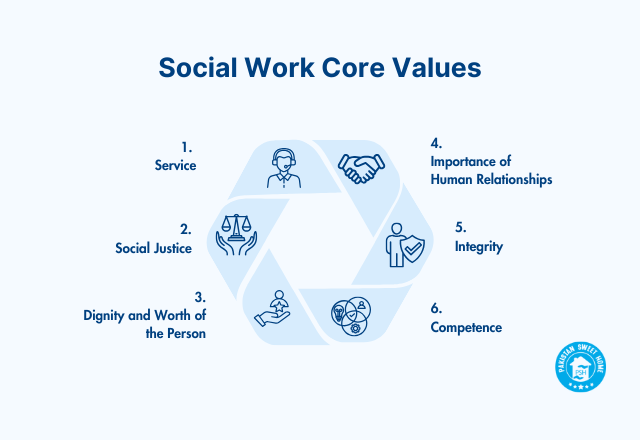Seeing people suffer—and not knowing who can truly help—can leave you feeling powerless.
Every day, children face abuse, families struggle with poverty, and communities battle mental health crises. But when it comes to finding help, many don’t even know which type of social worker to turn to.
That’s why understanding the types of social workers is so important—it’s the first step toward real change.
Let’s dive in and discover who these heroes are, what they do, and how they transform lives every day.
1. Administrative, Policy, and Research Social Workers
These professionals often hold senior roles, such as directors or managers, within healthcare agencies or social service organizations. They operate on a broad scale, overseeing government programs, advocating for those in need, and developing field of social work policies that benefit entire communities.
They conduct thorough research to identify the common challenges faced by community members, using these insights to shape effective policies. Many in this field possess advanced degrees, such as a Ph.D., and have experience in academic or research environments.
2. Gerontological Social Workers
Gerontological social workers help older adults find resources and services to make daily life easier. Social workers in this field advocate for their clients, ensuring they have access to the support needed for a healthy and stable lifestyle.
These social workers help seniors enroll in affordable healthcare programs and find mental health services when needed. They also assist in securing suitable housing or care facilities that meet the seniors’ needs.
3. Child Welfare and Family Social Workers
Child welfare and family social workers play a pivotal role in providing counseling to children and family members experiencing trauma. They often work closely with families to strengthen relationships through counseling and family therapy sessions. These social workers ensure that parents create a safe and caring environment for their children.
If a child’s home isn’t safe, the child welfare social workers can help find a safer place for the child to live. They also support families facing challenges such as teen pregnancy, poverty, homelessness, discrimination, and school truancy.
Pakistan Sweet Home, a leading orphanage NGO, transforms the lives of vulnerable children by providing shelter, education, and care. They create a safe and supportive environment for orphans to heal and grow. Their work highlights the vital role of child welfare social workers in protecting at-risk youth.
4. School Social Workers
School social workers help children manage their emotions, locate essential resources, and navigate complex family situations.
They usually work mostly in schools, supporting students facing issues like bullying or unstable housing. They team up with teachers and school leaders to find students who need help and create programs to keep all students healthy and happy.
5. Community and Advocacy Social Workers
Community and advocacy social workers often work with nonprofits or government agencies to oversee programs that serve the community. Their goal is to make sure everyone has access to the resources they need to stay healthy and safe.
Most community social workers have a bachelor's degree, which helps them do many outreach and support tasks. People with a master’s degree in social work can do counseling and help others stay healthy.
6. Criminal Justice and Corrections Social Workers
These social workers often work in courts, crisis centers, correctional facilities, or police departments. Some also work in hospitals, law firms, or advocacy organizations.
They support former inmates and their families by providing resources such as conflict mediation and rehabilitation programs. In crisis centers, they usually act as victim advocates, helping people recover from traumatic experiences.
7. Disability Social Workers
These social workers support individuals with disabilities and the parents of children with disabilities. They educate them about their legal rights and connect them with resources to help meet their specific needs.
They help clients find good housing, reach their school and job goals, and build skills to communicate and take care of themselves better. Since every client’s situation is unique, these social workers tailor their care plans to fit each person’s disability and individual challenges.
8. Medical Social Workers
People facing medical challenges often turn to medical social workers for help in managing their health and accessing affordable care. These licensed clinical social workers usually work in hospitals or healthcare settings. They review patients’ medical records and coordinate important services like therapy and rehabilitation.
Medical social workers also support patients’ families by providing education and guidance about the patient’s condition. They also work closely with doctors, nurses, and other healthcare staff to make sure patients get the best care.
9. Hospice and Palliative Care Social Workers
Patients with chronic or life-limiting illnesses often receive crucial support from hospice and palliative care social workers. These professionals assist both patients and their families in preparing emotionally and practically for the end-of-life journey.
Hospice and palliative social workers conduct psychosocial assessments and provide counseling to patients and their loved ones. They also coordinate with healthcare providers to ensure comfort and compassionate care.
They help families understand the patient’s condition and provide resources to cope with chronic or terminal illnesses. They also advocate for the patient’s physical and emotional needs throughout the care process.
10. Mental Health Social Workers
Mental health and substance abuse social workers mainly support people dealing with mental health issues such as depression, anxiety, schizophrenia, PTSD, dementia, bipolar disorder, and eating disorders.
They check the mental health of their clients and create care plans to support them. They also provide counseling to help people manage their conditions and do well in life and work. They often work in places like psychiatric hospitals, outpatient centers, or specialized clinics.
11. Military and Veterans Social Workers
Military social workers specialize in supporting veterans as they transition from military to civilian life. They make sure veterans get the money, mental health care, and support they need to handle everyday life.
They also help families facing problems like deployment or the loss of a family member in the military. Social workers with a degree in Master of Social Work, MSW, can diagnose PTSD and provide therapy to help veterans with mental illness problems.
12. Substance Abuse Social Workers
Some social workers help people recover from addiction and get the medical care they need. They often work in hospitals, clinics, government agencies, or nonprofit organizations.
They counsel people who are recovering and step in during crises to make sure they get medical help. They also teach clients how to live a healthy life without drugs or alcohol.
13. Occupational Social Workers
Occupational social workers help businesses support their employees’ physical and mental health. They also work to improve how well the workplace functions overall. They help strengthen company culture and create a positive work environment by recommending programs that support employees’ mental health.
They also provide education and resources to new employees. This helps them build confidence, improve communication skills, and speak up for their needs at work.
14. Public Health Social Workers
A public healthcare social worker operates on a broad, community-wide level to tackle major public health challenges. They collect and study information to understand what different groups need and make plans to help them.
These professionals often work with government agencies, healthcare organizations, and schools. They also team up with community groups to reach common public health goals.
15. Environmental Social Workers
Environmental social workers collaborate with communities to understand environmental challenges and how these impact people's lives.
They study problems like climate change, dirty water, and food shortages to help communities stay healthy and get what they need. These social workers often partner with local groups or political organizations to drive meaningful environmental and social change.
16. Political Social Workers
Political social workers work to create change at the local, state, and national levels. They often advocate for marginalized communities, striving to reduce the impact of issues like racism and economic hardship.
They use their social work skills to guide political campaigns, support lobbying, and help nonprofit organizations with their goals.
17. Trauma Social Workers
Trauma social workers provide support to people and groups who have gone through upsetting or harmful experiences. Their work spans diverse populations, including survivors of abuse, violence, natural disasters, war, or chronic neglect.
Trauma can quietly disrupt every aspect of a person’s life—from relationships to work to physical health. Trauma social workers help people and communities feel safe, heal from pain, and find hope to rebuild their lives.
In summary, the types of social workers each play a vital role in improving lives and building stronger communities. Whether it’s supporting children and families, assisting the elderly, addressing mental health and healthcare needs, or pushing for social justice, every type brings unique value.
From schools and hospitals to courts and community centers, social workers are everywhere—driving change, offering support, and standing up for those in need. Their diverse roles highlight just how essential social work is to the well-being of individuals and the progress of society.
Brighten an Orphan’s Future

info@pakistansweethome.org.pk
(051) 4865856
+92 335 1118477









